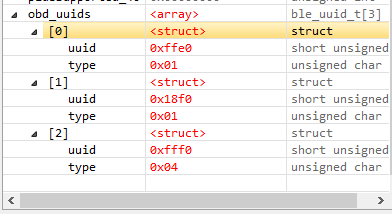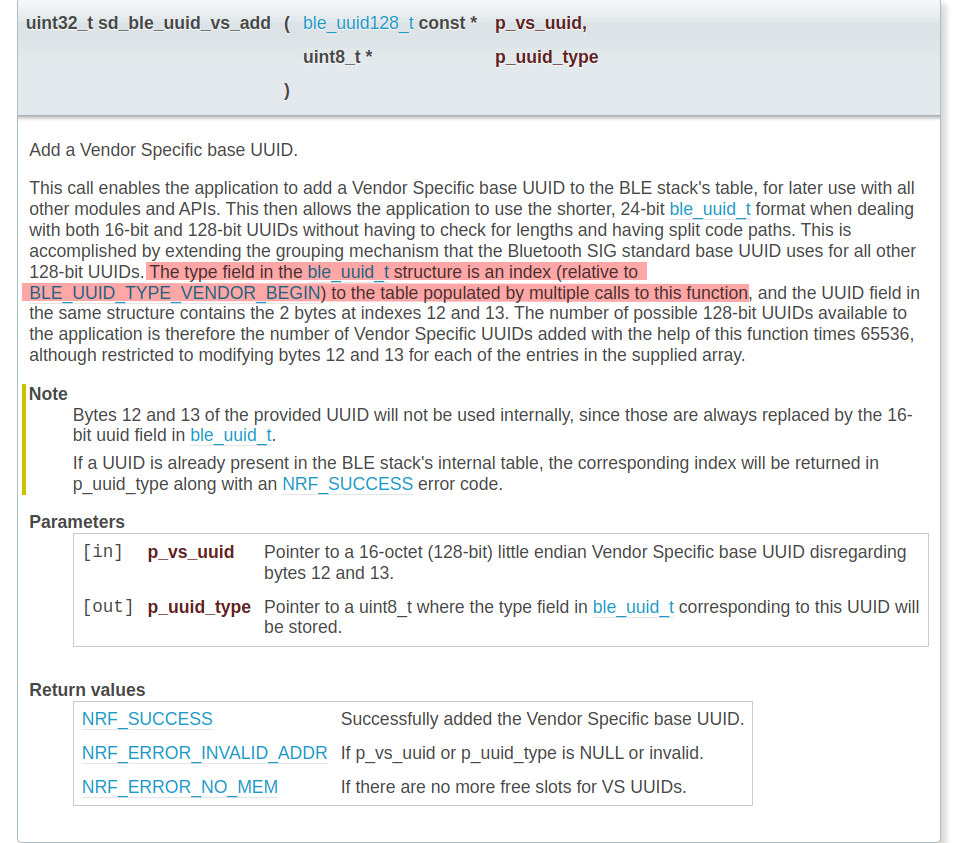I have been able to connect and initialize two different Bluetooth OBD II Devices. I am running into issues with the third device I am trying to add as an option. I add the Primary Services in the code below.
/**@brief Function for initializing the OBD client.
*
* @param[in] p_obd_service_client Pointer to the OBD client structure.
* @param[in] p_ble_obd_c_init Pointer to the OBD initialization structure.
*
* @return NRF_SUCCESS on successful initialization, otherwise an error code.
*/
uint32_t ble_obd_c_init(ble_obd_c_t * p_obd_service_client, ble_obd_c_init_t * p_ble_obd_c_init)
{
uint32_t err_code;
ble_uuid_t obd_uuids[] =
{
{ .uuid = BLE_UUID_LELINK_SERVICE, .type = BLE_UUID_TYPE_BLE },
{ .uuid = BLE_UUID_VLINK_SERVICE, .type = BLE_UUID_TYPE_BLE },
{ .uuid = BLE_UUID_FIXD_SERVICE, .type = BLE_UUID_TYPE_BLE }
};
VERIFY_PARAM_NOT_NULL(p_obd_service_client);
VERIFY_PARAM_NOT_NULL(p_ble_obd_c_init);
p_obd_service_client->conn_handle = BLE_CONN_HANDLE_INVALID;
p_obd_service_client->evt_handler = p_ble_obd_c_init->evt_handler;
p_obd_service_client->error_handler = p_ble_obd_c_init->error_handler;
p_obd_service_client->obd_service_rx_char.handle_value = BLE_GATT_HANDLE_INVALID;
p_obd_service_client->obd_service_tx_char.handle_value = BLE_GATT_HANDLE_INVALID;
p_obd_service_client->p_gatt_queue = p_ble_obd_c_init->p_gatt_queue;
p_obd_service_client->uuid_type = BLE_UUID_TYPE_BLE;
// Register all UUIDs
for (uint8_t i = 0; i < sizeof(obd_uuids) / sizeof(obd_uuids[0]); i++)
{
err_code = ble_db_discovery_evt_register(&obd_uuids[i]);
if (err_code != NRF_SUCCESS)
{
return err_code;
}
}
return NRF_SUCCESS;
}
I add filters to find the devices by name. After I connect to the found device, I start the database discovery.
case BLE_GAP_EVT_CONNECTED:
obd_conn_handle = p_ble_evt->evt.gap_evt.conn_handle;
NRF_LOG_INFO("Connected to OBD with conn_handle: %d", obd_conn_handle);
// Use discovery to find ble services
err_code = ble_db_discovery_start(&m_db_disc, obd_conn_handle);
APP_ERROR_CHECK(err_code);
break;
The following snippet shows my code for my database discovery event.
/**@brief Function for handling database discovery events for the OBD service.
*
* @param[in] p_obd_service_client Pointer to the OBD client instance.
* @param[in] p_evt Pointer to the discovery event structure.
*/
void ble_obd_c_on_db_disc_evt(ble_obd_c_t * p_obd_service_client, ble_db_discovery_evt_t * p_evt)
{
memset(&obd_c_evt, 0, sizeof(ble_obd_c_evt_t));
ble_gatt_db_char_t * p_chars = p_evt->params.discovered_db.charateristics;
// Check if the OBD was discovered.
if (p_evt->evt_type == BLE_DB_DISCOVERY_COMPLETE &&
(p_evt->params.discovered_db.srv_uuid.uuid == BLE_UUID_LELINK_SERVICE ||
p_evt->params.discovered_db.srv_uuid.uuid == BLE_UUID_VLINK_SERVICE ||
p_evt->params.discovered_db.srv_uuid.uuid == BLE_UUID_FIXD_SERVICE) &&
(p_evt->params.discovered_db.srv_uuid.type == p_obd_service_client->uuid_type))
{
for (uint32_t i = 0; i < p_evt->params.discovered_db.char_count; i++)
{
switch (p_chars[i].characteristic.uuid.uuid)
{
case BLE_UUID_LELINK_RX_CHARACTERISTIC:
case BLE_UUID_VLINK_RX_CHARACTERISTIC:
case BLE_UUID_FIXD_RX_CHARACTERISTIC:
// Found OBD characteristic inside the OBD Service.
p_obd_service_client->obd_service_rx_char = p_chars[i].characteristic;
p_obd_service_client->obd_cccd_handle = p_chars[i].cccd_handle;
NRF_LOG_INFO("Discovered rx characteristic handle: %i", p_chars[i].characteristic.handle_value);
break;
case BLE_UUID_LELINK_TX_CHARACTERISTIC:
case BLE_UUID_VLINK_TX_CHARACTERISTIC:
case BLE_UUID_FIXD_TX_CHARACTERISTIC:
// Found OBD characteristic inside the OBD Service.
p_obd_service_client->obd_service_tx_char = p_chars[i].characteristic;
NRF_LOG_INFO("Discovered tx characteristic handle: %i", p_chars[i].characteristic.handle_value);
break;
default:
break;
}
}
if (p_obd_service_client->evt_handler != NULL)
{
obd_c_evt.conn_handle = p_evt->conn_handle;
obd_c_evt.evt_type = BLE_OBD_C_EVT_DISCOVERY_COMPLETE;
p_obd_service_client->evt_handler(p_obd_service_client, &obd_c_evt);
}
}
else if (p_evt->evt_type == BLE_DB_DISCOVERY_SRV_NOT_FOUND)
{
if (p_evt->params.discovered_db.srv_uuid.uuid == BLE_UUID_FIXD_SERVICE)
{
NRF_LOG_INFO("Service Not Found, UUID: 0x%04X", p_evt->params.discovered_db.srv_uuid.uuid);
}
}
}
For the LE Link and VLINK devices, the event type is BLE_DB_DISCOVERY_COMPLETE and gets their service uuids that contain the tx and rx characteristics. The issue is with the FIXD device. The output says "<info> ble_obd_c: Service Not Found, UUID: 0xFFF0" yet this is the service I am looking for. The event type says "BLE_DB_DISCOVERY_SRV_NOT_FOUND" yet the uuid is equal to the BLE_UUID_FIXD_SERVICE (which is 0xFFF0). I have attached the attribute table from the nRF52 connect app which connects to the FIXD Device fine.

I also have wireshark logs of a OBD II phone app connecting to the device and what the nRF52 does when trying to connect if that helps at all as well. This was all developed using nRF52 sdk 17.0.2.
4073.VLINK to iOS Capture from connecting.pcapngVLINK to nRF52 Capture from connecting.pcapng





